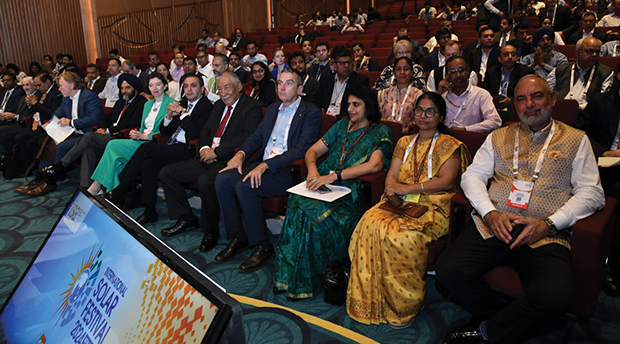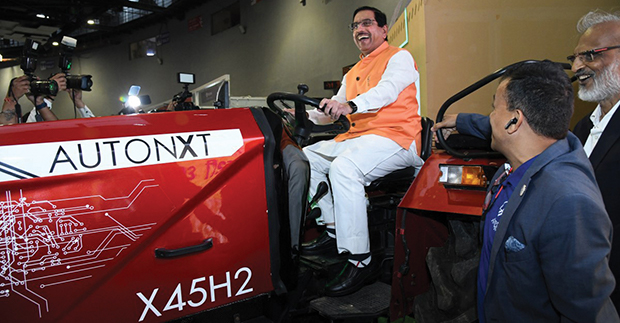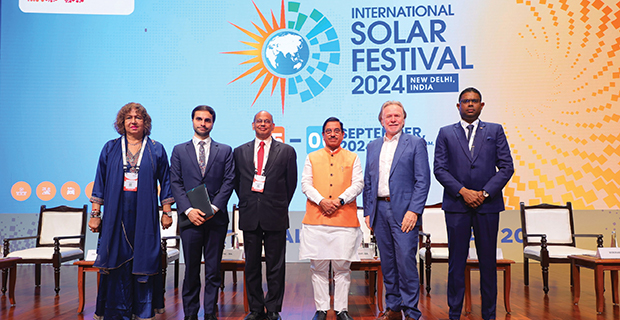A GRAND SUCCESS

A view of the distinguished delegates and audience
Dr. Ajay Mathur, Director General of the ISA, praised the Alliance’s efforts in accelerating the growth of solar energy globally, stating, “Our mission is to make solar the foundation for a prosperous and sustainable planet. Solar power’s robust year-on-year growth is driving economic upliftment and global transformation. However, investments remain concentrated in a few countries, and expanding access to solar energy globally is critical.”
Speaking to the India Empire (also read his exclusive interview with our Business Editor), Dr. Mathur explained how the guarantee helps in attracting investments. “The problem is that while a lot of money has been invested in solar, it is largely going to a few countries. When we asked investors why they were not investing in other countries, they said they would not get returns for their investment. They lack confidence that there will be a pipeline of projects. So, what the guarantee does is if an entity is investing in a small scale solar project in say Africa, we will guarantee that investment. For this our member countries are gathering and putting together the resources to create the guarantee.”
Why Africa in particular? “We see the greatest problem of imbalance in Africa, it has only 3 percent of the global renewable capacity whereas it has around 60 percent of the world’s solar potential.” The next endeavor will be in Asia. “We are working with the Asian Development Bank in identifying the kinds of challenges that Asia faces.” The learning in Africa should help in augmenting the solar energy generation in Asia.

Minister Joshi sits on a X45H2 electric tractor at the exhibition complex
Mr Damien Syed, Deputy Head of Mission, French Embassy in New Delhi, representing France’s co-presidency of the ISA, said, “France has made an exceptional contribution of 1 million euro to the STAR-C program, focusing in the first phase on three pilot countries and attached regional centres for renewable energy: Senegal in West Africa, Papua Guinea in the Indo Pacific and Bhutan in Asia. The interest raised amongst member countries for STAR-C is very encouraging and reflects the significant needs of emerging and developing countries in the field of capacity building.”
In their virtual messages, Bhutan’s Prime Minister Tshering Tobgay commended the ISA for aiding solar energy development in rural areas through regulatory support and capacity building. Mauritian Prime Minister Pravind Jugnauth highlighted the ISA’s role in achieving 30% solar energy by 2030, vital for climate-vulnerable Small Island Developing States like Mauritius.
PM Tobgay, in his virtual address, highlighted his country’s significant strides in integrating solar energy into the country’s national energy strategy. It has advanced in establishing regulatory frameworks, enhancing capacity and building solar powered cold storage, each vital to diversify Bhutan’s energy portfolio and enhancing energy security. Additionally, it has successfully extended electricity to very remote villages through solar energy solutions and thus has improved the quality of life of many rural communities. “As a small landlocked nation, Bhutan values the power of collaboration and shared knowledge in overcoming barriers for sustainable development,” he said.
Mauritius is in the frontline of the climate change emergency, bearing the brunt of the adverse effects of greenhouse gas emission. PM Jugnauth in his virtual address mentioned that Mauritius had set an ambitious target of achieving 60 percent of renewable energy in its electricity mix by 2030. According to the country’s renewable energy roadmap, solar energy is expected to contribute more than 30 per cent to the electricity mix by 2030, requiring an estimated investment of 750 million US dollars.











Comments.